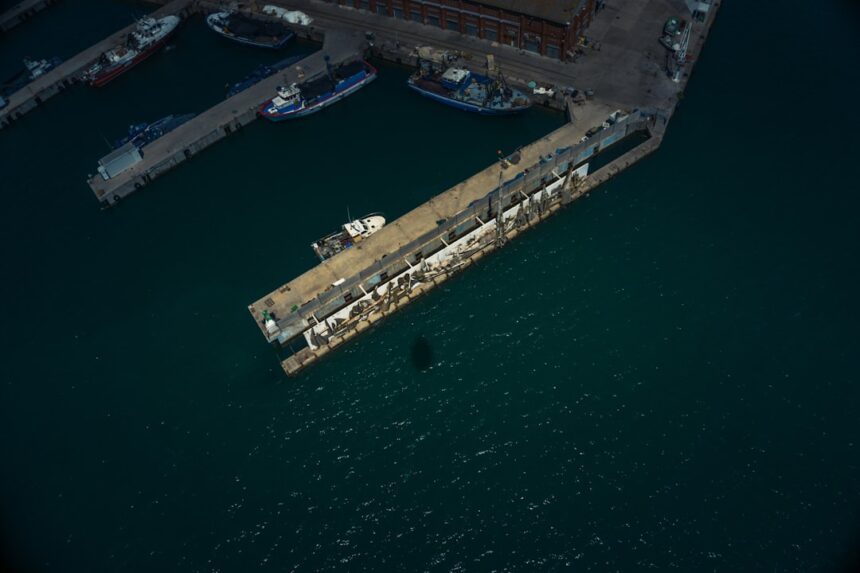The roots of Russian maritime intelligence can be traced back to the early days of the Russian Empire, when the need for naval power became increasingly apparent. The establishment of the Russian Navy in the 18th century marked a significant turning point, as it necessitated the development of intelligence capabilities to protect maritime interests and enhance naval operations. During the reign of Peter the Great, the foundation was laid for a structured approach to maritime intelligence, which included the gathering of information on foreign naval capabilities and trade routes.
This early focus on intelligence gathering was crucial for Russia’s expansion into the Baltic Sea and later into the Black Sea, where naval dominance became a key component of its geopolitical strategy. As the 19th century unfolded, Russian maritime intelligence evolved further, particularly during conflicts such as the Crimean War. The need for accurate information about enemy fleets and coastal defenses became paramount, leading to the establishment of dedicated intelligence units within the navy.
These units were tasked with reconnaissance missions and the collection of data on foreign naval activities. The advent of new technologies, such as telegraphy and photography, also played a significant role in enhancing the capabilities of Russian maritime intelligence, allowing for more efficient communication and data collection. By the early 20th century, Russia had developed a more sophisticated maritime intelligence apparatus, which would continue to adapt and evolve through the tumultuous events of World War I and the subsequent Russian Civil War.
Key Takeaways
- Russian maritime intelligence has a long history dating back to the 16th century, with a focus on gathering information about enemy naval capabilities and movements.
- In modern warfare, Russian maritime intelligence plays a crucial role in providing strategic and tactical information to support military operations, including monitoring enemy naval activities and conducting reconnaissance missions.
- The structure of Russian maritime intelligence is organized within the Main Intelligence Directorate of the Russian General Staff, with specialized units focused on naval intelligence gathering and analysis.
- Russian maritime intelligence utilizes advanced technology and equipment, including satellite imagery, unmanned underwater vehicles, and electronic surveillance systems, to gather and analyze maritime information.
- Russian maritime intelligence faces challenges in the 21st century, including increased competition in the maritime domain, evolving technology, and the need to adapt to new geopolitical dynamics.
The Role of Russian Maritime Intelligence in Modern Warfare
In contemporary warfare, Russian maritime intelligence plays a pivotal role in shaping naval strategies and operations. The modern battlefield is not confined to land; it extends into the vast expanses of oceans and seas, where control over maritime routes can determine the outcome of conflicts. Russian military doctrine emphasizes the importance of maritime operations, and intelligence is at the heart of these strategies.
By gathering and analyzing data on enemy movements, naval capabilities, and potential threats, Russian maritime intelligence enables commanders to make informed decisions that can significantly impact operational success. Moreover, the integration of maritime intelligence with other military branches enhances Russia’s overall combat effectiveness. In recent conflicts, such as those in Syria and Ukraine, maritime intelligence has provided critical insights that have informed air and ground operations.
The ability to monitor shipping lanes, track naval assets, and assess potential threats from adversaries allows Russian forces to maintain a strategic advantage. This interconnectedness underscores the importance of maritime intelligence not only in naval engagements but also in joint operations that require seamless coordination among various military units.
The Structure and Organization of Russian Maritime Intelligence

The organizational structure of Russian maritime intelligence is complex and multifaceted, reflecting the diverse challenges it faces in a rapidly changing global landscape. At its core is the Main Directorate of the General Staff of the Armed Forces of the Russian Federation (GRU), which oversees all military intelligence operations, including those related to maritime activities. Within this framework, specialized units focus specifically on naval intelligence, employing a range of methods to gather information from various sources.
These specialized units are often composed of highly trained personnel with expertise in areas such as signals intelligence (SIGINT), human intelligence (HUMINT), and geospatial intelligence (GEOINT). This diverse skill set allows them to collect and analyze data from multiple channels, including satellite imagery, electronic communications, and on-the-ground reconnaissance. Additionally, collaboration with other branches of military intelligence enhances their capabilities, enabling them to share insights and coordinate efforts effectively.
This structured approach ensures that Russian maritime intelligence remains agile and responsive to emerging threats in an increasingly complex geopolitical environment.
The Technology and Equipment Used by Russian Maritime Intelligence
| Technology and Equipment | Description |
|---|---|
| Satellite Communication Systems | Used for long-range communication and data transmission. |
| Underwater Drones | Utilized for underwater surveillance and reconnaissance. |
| Radar Systems | Provide detection and tracking of surface vessels and aircraft. |
| Electronic Warfare Systems | Used to disrupt or disable enemy communication and radar systems. |
| Sonar Technology | Enables detection and tracking of submarines and underwater objects. |
The technological landscape of Russian maritime intelligence is characterized by a blend of traditional methods and cutting-edge innovations. The integration of advanced technologies has revolutionized how intelligence is gathered, analyzed, and disseminated. Satellite systems play a crucial role in providing real-time imagery and data on naval activities across vast distances.
These satellites enable Russian analysts to monitor shipping routes, track naval vessels, and assess potential threats from adversaries. In addition to satellite technology, Russia has invested heavily in developing sophisticated underwater surveillance systems. These systems include sonar technology capable of detecting submarines and underwater drones designed for reconnaissance missions.
The use of unmanned aerial vehicles (UAVs) has also become increasingly prevalent in maritime operations, allowing for aerial surveillance without risking human lives. This combination of technologies enhances Russia’s ability to maintain situational awareness in contested maritime environments and respond swiftly to emerging threats.
The Challenges Faced by Russian Maritime Intelligence in the 21st Century
Despite its advancements, Russian maritime intelligence faces several challenges in the 21st century that could impact its effectiveness. One significant challenge is the rapid pace of technological change among adversaries. As other nations invest in advanced surveillance systems and cyber capabilities, Russia must continuously adapt its own technologies to maintain a competitive edge.
This arms race in intelligence capabilities requires substantial investment in research and development, which can strain resources. Another challenge lies in the geopolitical landscape itself.
The rise of non-state actors and asymmetric warfare further complicates traditional intelligence-gathering methods. In this context, Russian maritime intelligence must develop new strategies to address these evolving threats while ensuring that it remains aligned with broader national security objectives.
The Relationship Between Russian Maritime Intelligence and Other Branches of the Military

The relationship between Russian maritime intelligence and other branches of the military is characterized by a high degree of interdependence. Effective military operations require seamless coordination between various units, and intelligence plays a critical role in facilitating this collaboration. For instance, naval forces rely on timely and accurate information from maritime intelligence to inform their operational planning and execution.
Joint exercises involving multiple branches of the military often emphasize the importance of integrated intelligence sharing. These exercises allow for real-time testing of communication protocols and operational strategies that involve both naval and ground forces. By fostering collaboration between different military branches, Russian maritime intelligence enhances overall combat readiness and ensures that all units are operating with a shared understanding of the operational environment.
The Importance of Russian Maritime Intelligence in Geopolitical Strategy
Russian maritime intelligence is not merely a tool for military operations; it is also a vital component of Russia’s broader geopolitical strategy. Control over key maritime routes can significantly influence global trade dynamics and energy supplies, making maritime intelligence essential for safeguarding national interests. By monitoring shipping lanes and assessing potential threats from rival nations, Russia can position itself strategically in international waters.
Furthermore, maritime intelligence informs Russia’s diplomatic efforts by providing insights into regional developments that may impact its foreign policy decisions. Understanding the naval capabilities and intentions of other nations allows Russia to engage more effectively in negotiations and alliances. This strategic foresight enables Russia to project power beyond its borders while safeguarding its interests in contested regions.
The Training and Recruitment of Russian Maritime Intelligence Officers
The recruitment and training processes for Russian maritime intelligence officers are rigorous and designed to produce highly skilled professionals capable of navigating complex operational environments. Candidates typically undergo extensive screening processes that assess their analytical abilities, technical skills, and psychological resilience. Once selected, officers receive specialized training that encompasses various aspects of maritime operations, including reconnaissance techniques, data analysis, and communication protocols.
Training programs often include practical exercises that simulate real-world scenarios, allowing officers to hone their skills in high-pressure situations. Additionally, ongoing education is emphasized to ensure that personnel remain abreast of emerging technologies and evolving threats. This commitment to continuous learning fosters a culture of adaptability within Russian maritime intelligence, enabling officers to respond effectively to dynamic challenges in an ever-changing geopolitical landscape.
The Impact of Russian Maritime Intelligence on Global Security
The activities of Russian maritime intelligence have far-reaching implications for global security dynamics. As Russia continues to assert its influence in contested regions such as the Arctic and the Black Sea, its maritime intelligence capabilities play a crucial role in shaping regional stability. The ability to monitor adversaries’ naval movements and assess potential threats contributes to a more comprehensive understanding of security challenges faced by nations worldwide.
Moreover, Russia’s strategic use of maritime intelligence can provoke responses from other nations seeking to counterbalance its influence. This interplay between Russian actions and international reactions creates a complex security environment where tensions can escalate rapidly. As countries invest in their own maritime capabilities in response to perceived threats from Russia, the potential for conflict increases, underscoring the importance of effective communication and diplomacy in mitigating risks.
Case Studies of Russian Maritime Intelligence Operations
Several case studies illustrate the effectiveness of Russian maritime intelligence in recent years. One notable example is Russia’s involvement in the Syrian conflict, where its naval forces played a critical role in supporting ground operations against ISIS. Through meticulous intelligence gathering on enemy positions and movements along the coast, Russian forces were able to conduct targeted strikes that significantly weakened terrorist capabilities.
Another case study involves Russia’s activities in the Arctic region, where it has sought to assert its sovereignty over disputed territories while monitoring NATO naval exercises nearby. By leveraging advanced surveillance technologies and gathering intelligence on foreign naval activities, Russia has been able to bolster its claims while simultaneously preparing for potential confrontations with adversaries operating in this strategically important area.
The Future of Russian Maritime Intelligence and its Implications for International Relations
Looking ahead, the future of Russian maritime intelligence will likely be shaped by ongoing technological advancements and shifting geopolitical dynamics. As new technologies emerge—such as artificial intelligence and quantum computing—Russia will need to adapt its intelligence-gathering methods accordingly to maintain its competitive edge over adversaries. Furthermore, as global power dynamics continue to evolve with rising multipolarity, Russia’s approach to maritime intelligence will play a crucial role in shaping its relationships with other nations.
The ability to effectively gather and analyze information will not only inform military strategies but also influence diplomatic engagements as Russia navigates an increasingly complex international landscape. In conclusion, Russian maritime intelligence stands as a critical pillar within both military operations and broader geopolitical strategies. Its historical evolution reflects an ongoing commitment to adapting to new challenges while leveraging advanced technologies for effective information gathering.
As global security dynamics continue to shift, understanding the role and implications of Russian maritime intelligence will be essential for comprehending future international relations.
In recent years, Russian maritime intelligence operations have garnered significant attention due to their strategic implications and the sophisticated nature of their execution. These operations often involve the deployment of advanced surveillance technologies and naval assets to gather critical information on maritime activities worldwide. A related article that delves into the intricacies of these operations can be found on the website “In The War Room.” This article provides an in-depth analysis of the tactics employed by Russian intelligence and their impact on global maritime security. For more detailed insights, you can read the full article by visiting In The War Room.
WATCH THIS! The FSB’s Hidden War on Europe’s Pipelines
FAQs
What are Russian maritime intelligence operations?
Russian maritime intelligence operations refer to the activities conducted by the Russian military and intelligence agencies to gather information and intelligence through maritime means. This can include activities such as reconnaissance, surveillance, and intelligence gathering in and around maritime areas.
What are the objectives of Russian maritime intelligence operations?
The objectives of Russian maritime intelligence operations may include monitoring the activities of foreign naval forces, gathering information on maritime trade and shipping routes, and conducting reconnaissance of potential military targets or areas of strategic interest.
What methods are used in Russian maritime intelligence operations?
Russian maritime intelligence operations may involve the use of naval vessels, submarines, aircraft, and unmanned maritime vehicles to conduct surveillance and reconnaissance activities. Additionally, electronic surveillance and signals intelligence may also be utilized to gather information from maritime communications and electronic systems.
Where do Russian maritime intelligence operations take place?
Russian maritime intelligence operations can take place in various maritime regions, including the Baltic Sea, Black Sea, Arctic Ocean, and the Pacific Ocean. These operations may also extend to areas of strategic interest, such as the Mediterranean Sea and the Atlantic Ocean.
What are the implications of Russian maritime intelligence operations?
Russian maritime intelligence operations can have implications for regional security, international maritime trade, and geopolitical dynamics. These operations may also contribute to Russia’s military and strategic capabilities, as well as its ability to project power and influence in maritime regions.




